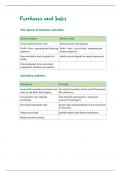Summary
Summary Purchases and Sales
- Institution
- University Of The Witwatersrand (wits)
This document clearly illustrates the different natures of business activities, being the service and retail entities. Multiple journal entry examples are given to help understand how purchasing and selling take place on the periodic and perpetual inventory systems. Journal entries including VAT an...
[Show more]



